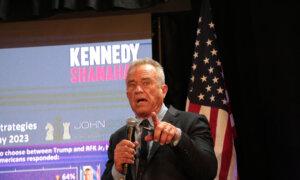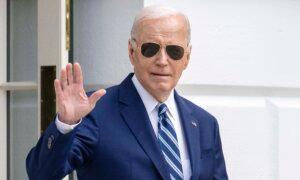Candidates must reach at least 15 percent in four national polls and appear on enough state ballot to gain 270 Electoral College votes, the rules state.
Robert F. Kennedy Jr. said he will meet the qualifications established by CNN to participate in the June 27 presidential debate, but it’s uncertain if President Joe Biden will take part in the forum if that happens.
The presumptive Democrat and Republican nominees agreed to take the stage in the earliest presidential debate in televised history on June 27 on CNN, the outlet confirmed in a May 15 press release.
The current and former presidents will also meet for a Sept. 10 debate televised by ABC.
According to debate qualification rules listed by CNN, a candidate’s name must appear on a sufficient number of state ballots to reach the 270 electoral vote threshold to win the presidency by the June 20 debate eligibility deadline, the outlet reported.
Candidates must also get “at least 15 percent in four separate national polls of registered or likely voters that meet CNN’s standards for reporting.”
Stefanie Spear, Mr. Kennedy’s press secretary, confirmed that the candidate would accept an invitation to participate in the June 27 event if he qualifies.
ABC News listed similar qualifications for its Sept. 10 debate.
The non-partisan Commission on Presidential Debates has overseen all presidential forums since 1988.
Initially, campaign officials for President Biden and former President Donald Trump expressed dismay about the possibility that the independent challenger could join their candidates on stage.
In a May 15 letter to the non-partisan Commission on Presidential Debates, President Biden’s campaign said the president would not participate in the commission’s planned fall debates, citing the preference for earlier dates.
President Trump’s campaign also sent a letter to the commission last month stating it would like earlier debates as well.
Both campaigns have said that CNN told them that Mr. Kennedy would not be part of the debate.
“Well, I have no problem with him. I think he’s really not doing well in the polls at all. His numbers have gone down a lot lately,” he told WTMJ-TV.
A CNN spokesperson has said that, to date, only President Biden and President Trump have qualified for its debate.
CNN, ABC News, CBS News, Fox News, Marquette University Law School, Monmouth University, NBC News, New York Times/Siena College, NPR/PBS News Hour/Marist College, Quinnipiac University, Wall Street Journal, and the Washington Post are the surveys that CNN says meet their editorial standards and will be considered for debate eligibility.
The window to determine eligibility for the June 27 debate opened on March 13 and closes on June 20, CNN reported.
Just as it remains unclear if the former and current presidents will move forward with appearing at the CNN debate if Mr. Kennedy meets the outlet’s requirements, it is unknown if they will take the stage in the Debate Commission’s three forums, which are Sept. 16 at Texas State University in San Marcos, Texas; Oct. 1 at Virginia State University in Petersburg, Virginia; and Oct. 9 at the University of Utah in Salt Lake City.
Upon learning that President Biden said he would bypass the Debate Commission and take part in the CNN and ABC News debates instead, Frank Fahrenkopf Jr. said he would “love to be a fly on the wall” when the campaigns meet to coordinate details of the June 27 debate.”
Mr. Fahrenkopf is a former RNC chair who is now co-chair of the Debate Commission.
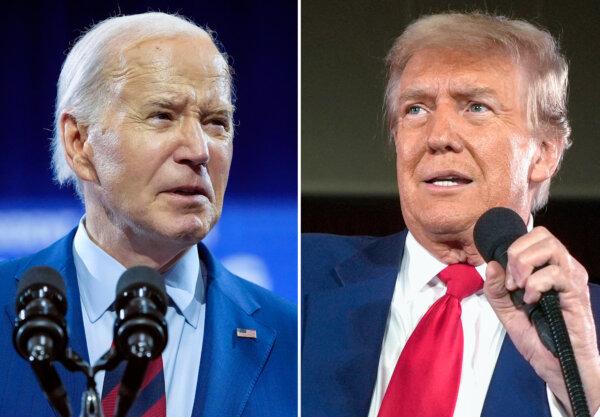
In a May 15 podcast appearance with No Labels chief strategist Ryan Clancy, Mr. Fahrenkopf said, “We were created to do all of this,” referencing particulars like selecting a moderator, attendees, and locations.
John F. Kennedy and Richard Nixon took part in the first televised presidential debates in 1960. There were three separate forums sponsored by NBC, ABC, and CBS.
The next presidential debate occurred in 1976.
Lyndon B. Johnson had no desire to take the stage with opponent Arizona Republican Sen. Barry Goldwater in 1964.
In 1968, Mr. Nixon did not want a repeat of 1960 with President Kennedy and declined to debate Democratic Vice President Hubert Humphrey.
As the incumbent president in 1972, he refused to debate South Dakota Democratic Sen. George McGovern of South Dakota.
“They both felt that if you were the president of the United States, and you allow someone who’s not the president on the podium with you, you’re raising their dignity, if you will,” Mr. Fahrenkopf said.
President Johnson and President Nixon cited the Federal Communications Commission’s equal-time guidelines for skipping the debates.
The rule would have mandated all third-party candidates to share the stage with them.
Mired in poor approval ratings, President Gerald Ford opted to debate Democrat presidential nominee Jimmy Carter in 1976.
In 1980, President Carter would not take the stage against former Illinois Congressman John Anderson, who polled at 17 percent and qualified for the forum.
Ronald Reagan, the former governor of California and the Republican presidential nominee, did debate Mr. Anderson. By the time the second debate arrived, Mr. Anderson’s poll numbers had slipped to 12 percent, Mr. Fahrenkopf recalled, so President Carter agreed to debate Mr. Reagan.
The League of Women Voters spearheaded presidential debates from 1976 to 1984. The Debate Commission was formed by Mr. Fahrenkopf, then RNC chair, and Paul Kirk, then DNC chair, as a nonpartisan organization in 1988.
Debate Commission rules require that independent candidates gain enough ballot access to secure 270 Electoral College votes and have at least 15 percent support in polls.
The commission works with Gallup, and they help select five polls, Mr. Fahrenkopf explained.
Ross Perot, the Reform Party nominee, was the last third-party candidate to participate in all three presidential debates in 1992, though his highest poll number was 7 percent. The Debate Commission did not have a minimum poll number requirement at the time.

The Debate Commission established its current rules in 2000. No independent or third-party candidate has met the 15 percent polling threshold since presidential debates started in 1960.
In response to the campaigns of President Biden and President Trump criticizing the scheduled dates for the Debate Commission’s forums, the organization noted in a statement that it “purposefully chose September 16 after a comprehensive study of early voting rules in every state.”
On Sept. 16, the day of the first debate, Pennsylvania voters can receive, complete, and return ballots at their county boards of elections, the statement pointed out. Early voting in every other stage starts later, the statement explained.
Ballot access hurdles, Mr. Fahrenkopf believes, are a key reason why independents have a difficult time qualifying for presidential debates. Republicans, Democrats, Libertarians, and the Green Party are on the ballot in all 50 states, he pointed out.
Gaining sufficient polling numbers is also a challenge.
The Libertarian Party has yet to nominate a candidate for 2024 and will do so this month at its national convention in Washington. Green Party nominee Dr. Jill Stein is consistently polling around 1.5 percent.
Mr. Kennedy has reached 16 percent in CNN and Quinnipiac polls.
Mr. Kennedy has said that he will meet the Debate Commission’s qualification guidelines if those debates are held.
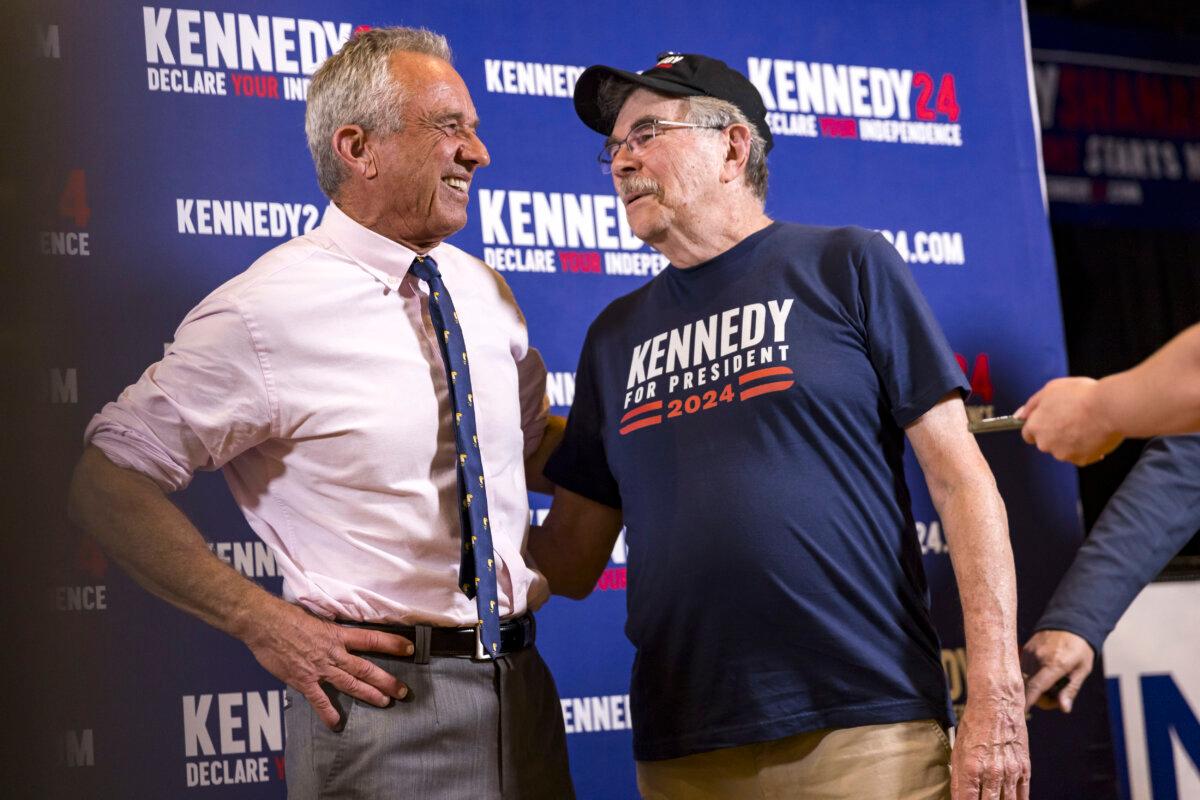
To avoid additional scrutiny from the DNC, Mr. Kennedy’s campaign is not submitting signatures in certain states, he told The Epoch Times.
“President Biden and the DNC have $3 billion to spend, and they are using that money to do everything they can to keep us off the ballot. We’re waiting as long as we can to submit signatures so they (the DNC) have a shorter amount of time (to potentially challenge them).”
Mr. Kennedy announced his candidacy to challenge President Biden for the Democrat Party nomination in April 2023.
After encountering multiple roadblocks from the Democratic National Committee and claiming that the organization was “rigging the primary” to favor President Biden and prevent other candidates from competing, he chose to run as an independent in October 2023.
Since then, Mr. Kennedy has focused on gaining ballot access in all 50 states and the District of Columbia.
On May 16, Mr. Kennedy announced that his campaign had collected enough signatures to appear on the New Jersey general election ballot, adding to a list that already includes New Hampshire, Nevada, Hawaii, North Carolina, Idaho, Nebraska, Iowa, and Ohio.
The Kennedy-Nicole Shanahan ticket has secured a spot on the ballot in California, Delaware, Michigan, Oklahoma, Texas, and Utah.
To date, the campaign has met signature requirements for ballot access in 14 states, representing 187 electoral votes. A candidate must reach 270 Electoral College votes to win the presidency.
Mr. Kennedy has told The Epoch Times in multiple interviews that he will be on the ballot in all 50 states and the District of Columbia.
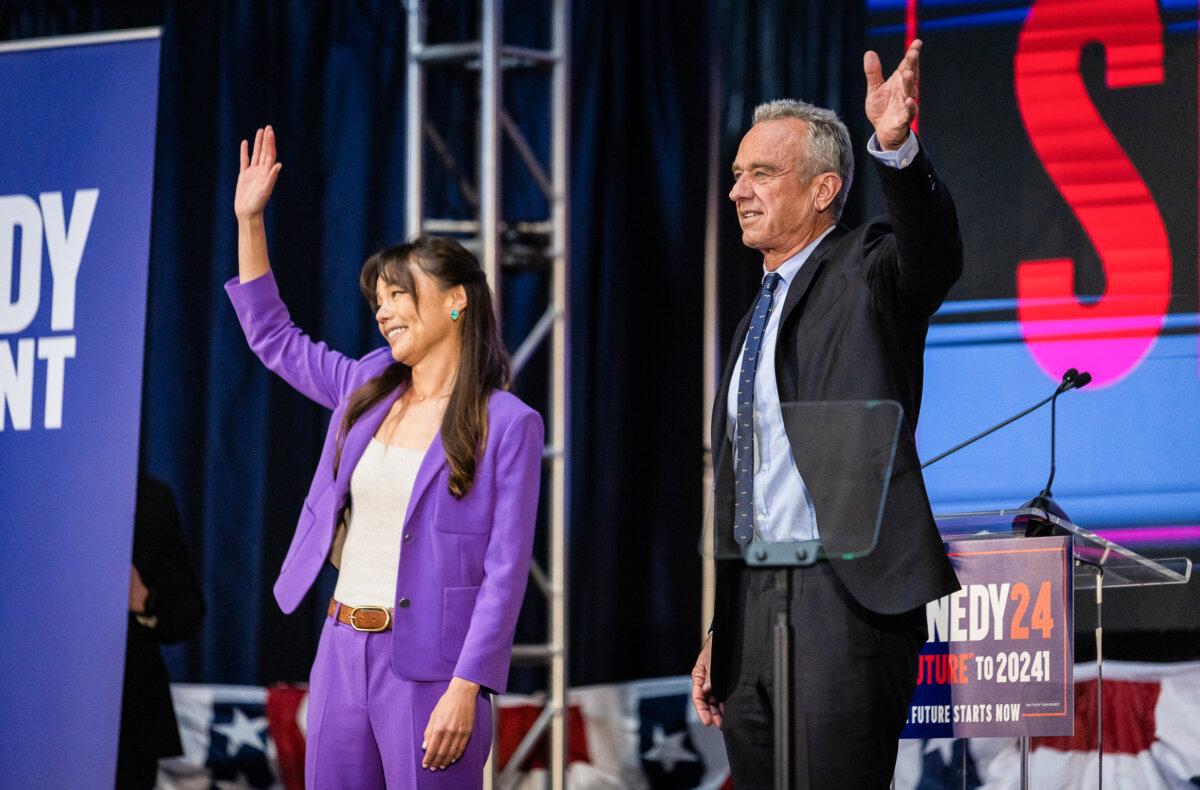
On May 16, his campaign announced that it had successfully secured the necessary funding to achieve that goal.
The milestone was made possible by a large donation to the campaign from Ms. Shanahan.
A campaign press release noted that Ms. Shanahan contributed an “additional $8 million” to the campaign in April.
At a recent campaign stop, Mr. Kennedy said that he would announce one to three states per week where they have secured ballot access.
Mr. Kennedy has challenged President Biden and President Trump to debates multiple times.
On May 15, he expressed his dismay at not being included in a post on X.
“Presidents Trump and Biden are colluding to lock America into a head-to-head match-up that 70 percent say they do not want. They are trying to exclude me from their debate because they are afraid I would win,” Mr. Kennedy wrote.
“Keeping viable candidates off the debate stage undermines democracy. Forty-three percent of Americans identify as independents.
“If Americans are ever going to escape the hammerlock of the two-party system, now is the time to do it.
“These are the two most unpopular candidates in living memory.”
Original News Source Link – Epoch Times
Running For Office? Conservative Campaign Consulting – Election Day Strategies!

